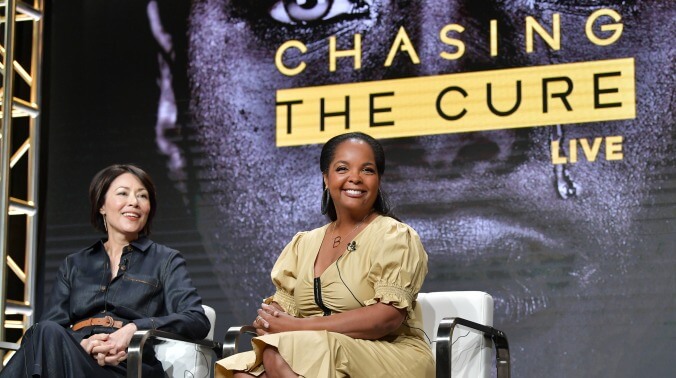Kim Bondy on Chasing The Cure with Ann Curry, plus two sentences on Two Sentence Horror Stories

Here’s what’s happening in the world of television for Thursday, August 8. All times are Eastern.
Top pick
Chasing The Cure (TBS and TNT, 9 p.m.): Here’s something new.
This live Ann Curry-hosted series, simulcast on TNT and TBS, aims to connect people across the globe who may be suffering from the same “undiagnosed, misdiagnosed or uncured medical mysteries.” The show arrives paired with social media groups and pages, as well as a dedicated, moderated website that allows viewers to upload their own “case studies” and seek help from others (as well as the show’s panel of doctors, ethicists, psychologists, and so on.)
We spoke with journalist Kim Bondy, Chasing The Cure’s showrunner, about the series’ aims and the risks of misinformation.
The A.V. Club: What would this show have looked like 10 years ago? Would it have existed at all?
Kim Bondy: I think it would be different mostly because of the technology, right? We weren’t where we are with social interaction. No matter where you are in the country, no matter where you are in the world, you can reach out. People are using social interaction in many different ways. It’s not just about keeping up with your high school friends, which is important. It’s about the sense of community that you can have globally, and that has really come to pass in the last 10 to 12 years.
AVC: So, social media as a force for good?
KB: Exactly. Chasing The Cure can bring us all back to a time of, “Oh, we can actually communicate. This is a communication tool. This is a tool for awareness. There’s a tool that can help.” Whether you’re in Tennessee or Oregon or Cairo, you can reach out and say, “I had that same thing,” or “My mother experienced the same thing,” or “Have you tried this?” And then there are medical professionals who can weigh in.
AVC: What’s the optimal way to experience this show?
KB: I think it starts digitally. If you are in Kansas, let’s say, and you want to interact with the platform, you can upload your own case file. You’re 100 percent in control of that yourself. Or if you want to weigh in on cases, you can go and look at the community of people and interact with them. We’re already seeing social interaction, people saying, have you tried this? You know, have you thought about this? Then we elevate to the television experience where you’ll get to see the people who you have been reading about. You get to see more of their story. And then you get to see the way that the doctors and the broader medical community will interact with them live in studio, and then we’ll continue to follow their journeys.
AVC: We’re living in a moment in which the risks of misinformation are painfully apparent—politically, but also medically, with the anti-vaccination movement and so on. How do you keep bad actors from infecting the ideal you’re describing?
KB: We do have people that are working in the community monitoring conversations while respecting free speech, but people should be able to interact with each other in a way that is smart and helpful. What we hope is that there is enough discernment in the conversations, that it all comes back to what’s grounded in truth. [It’s important] for us to not do any harm by layering in too many guardrails… This should be a place where people can still socially interact with each other and be helpful. We don’t want to be traffic cops, but we want to make sure that information, real factual information, is there as part of that discourse.
AVC: So say someone enters the conversation and says “eating local honey cured my cancer.” What happens next?
KB: We don’t want to be disruptive to the conversations, but most of the people who are on those sites are their own medical detectives. They know their illnesses really well. I’ve already seen where they’re pushing back on their own and saying, “Oh, thank you for that comment… You know what, I’ve never seen any information like that. Our goal is to not get in the way of those kinds of conversations, as long as the intent is good. And if we think that it is disruptive at all, then we would have someone on the team weigh in. We really don’t want to be in the business of policing free speech and of people having helpful conversations. That’s a really delicate dance, but the site is monitored 24/7.
Regular coverage
Wild card
Two Sentence Horror Stories (The CW, 9 p.m., series premiere): Think of these as 30-minute horror movies.
In the first one, a doll blinks.